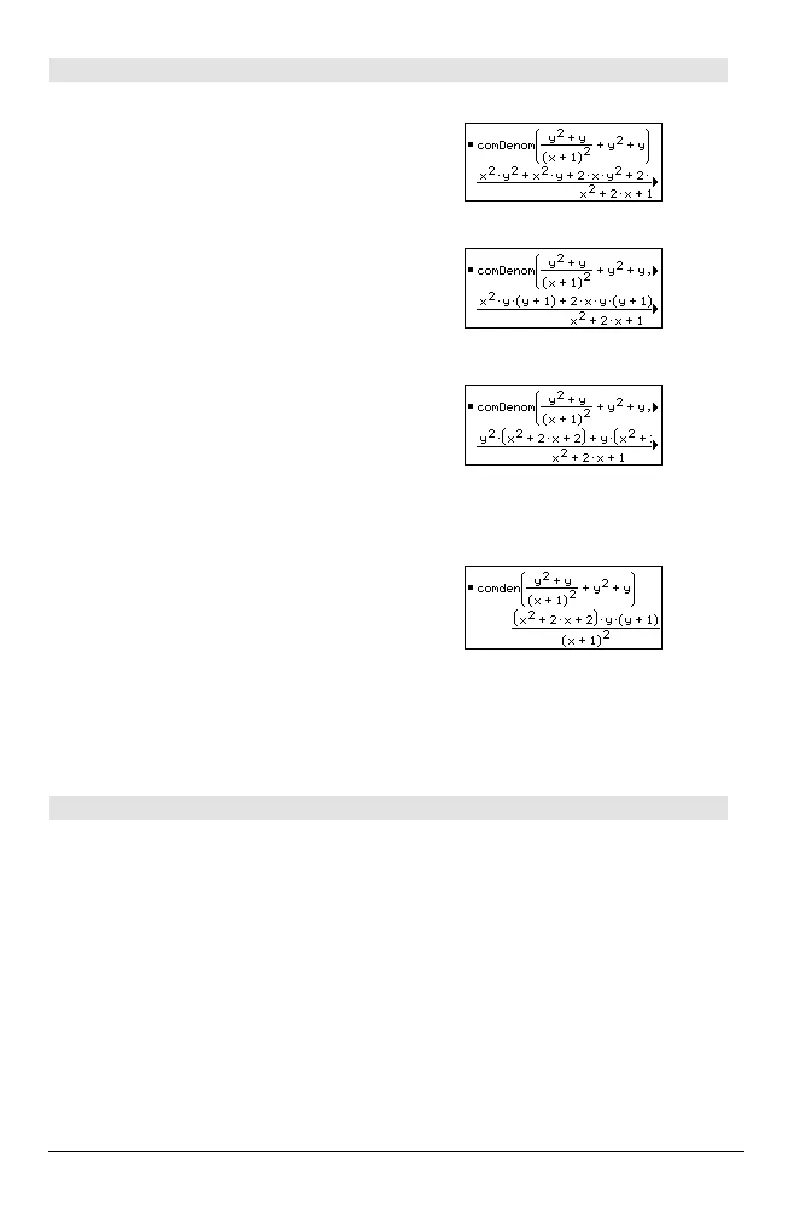Appendix A: Functions and Instructions 793
comDenom() MATH/Algebra menu
comDenom(
expression1
[
,var
]) ⇒
⇒⇒
⇒
expression
comDenom(
list1
[
,var
]) ⇒
⇒⇒
⇒
list
comDenom(
matrix1
[
,var
]) ⇒
⇒⇒
⇒
matrix
comDenom(
expression1
) returns a reduced ratio of
a fully expanded numerator over a fully expanded
denominator.
comDenom((y^2+y)/(x+1)^2+y^2+y)
¸
comDenom(
expression1,var
) returns a reduced
ratio of numerator and denominator expanded with
respect to
var
. The terms and their factors are
sorted with
var
as the main variable. Similar powers
of
var
are collected. There might be some incidental
factoring of the collected coefficients. Compared to
omitting
var
, this often saves time, memory, and
screen space, while making the expression more
comprehensible. It also makes subsequent
operations on the result faster and less likely to
exhaust memory.
comDenom((y^2+y)/(x+1)
^2+y^2+y,x) ¸
comDenom((y^2+y)/(x+1)
^2+y^2+y,y) ¸
If
var
does not occur in
expression1
,
comDenom(
expression1,var
) returns a reduced
ratio of an unexpanded numerator over an
unexpanded denominator. Such results usually save
even more time, memory, and screen space. Such
partially factored results also make subsequent
operations on the result much faster and much less
likely to exhaust memory.
comDenom(exprn,abc)!comden
(exprn) ¸ Do
comden((y^2+y)/(x+1)^2+y^2+y)
¸
Even when there is no denominator, the comden
function is often a fast way to achieve partial
factorization if
factor() is too slow or if it exhausts
memory.
Hint: Enter this
comden() function definition and
routinely try it as an alternative to
comDenom()
and
factor().
comden(1234x^2ù (y^3ì y)+2468xù (y^2
ì 1))
¸
1234ø xø (xø y + 2)ø (yñì1)
conj() MATH/Complex menu
conj(
expression1
) ⇒
⇒⇒
⇒
expression
conj(
list1
) ⇒
⇒⇒
⇒
list
conj(
matrix1
) ⇒
⇒⇒
⇒
matrix
Returns the complex conjugate of the argument.
Note: All undefined variables are treated as real
variables.
conj(1+2
i
) ¸ 1 ì 2ø
i
conj([2,1ì 3
i
;ë
i
,ë 7]) ¸
[]
2 1+3ø
i
i
ë 7
conj(z) z
conj(x+
i
y) x + ë
i
ø y

